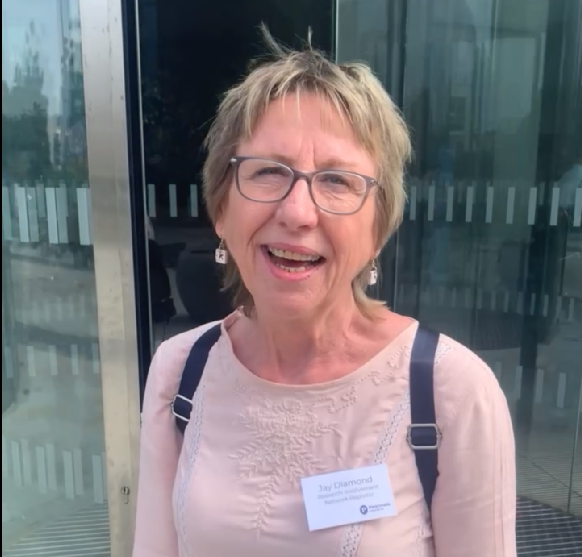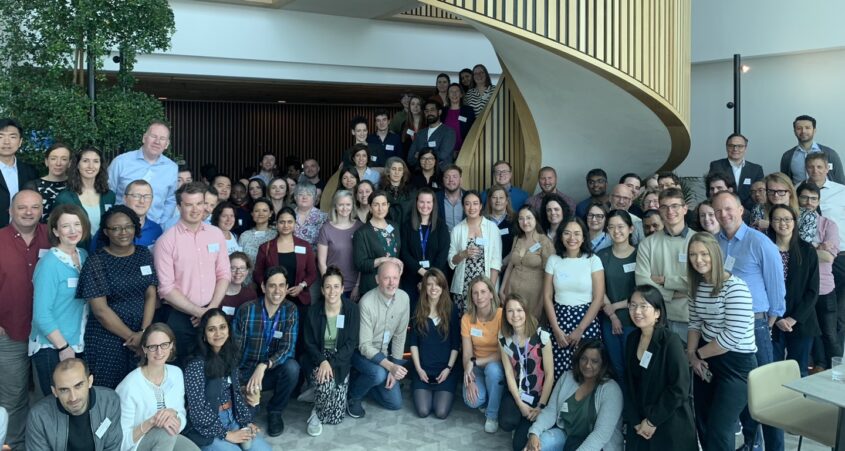



Research Involvement Network: Jay's story
A member of Pancreatic Cancer UK’s Research Involvement Network tells us about the annual Discovery and Translational Research Forum
Jay is a member of our Research Involvement
Network (RIN).
In this post, Jay breaks down what the researchers have been working on and the conversations she had at our annual Discovery and Translational Research Forum.
My name is Jay, I am a member of Pancreatic Cancer UK’s Research Involvement Network (RIN), a group of people affected by pancreatic cancer who help shape the charity’s research activities.
The RIN is totally focused on helping people with pancreatic cancer in every way they can, and especially in funding research to both find a way to detect this insidious disease early and to find a way to cure it. If I can help in this small way, I will do it in memory of my husband Arthur who I loved and lost to pancreatic cancer, in the hope that others don’t suffer in the same way.
Earlier this year, I was privileged to be invited to attend the charity’s annual Discovery and Translational Research Forum and report back on behalf of the RIN. In this blog, I share my experiences.
Moving research from bench to bedside
I wondered what they meant by Translational Research, so I did what we all do, I looked it up online. It means to help us understand scientific research so we can make it work for the end user, the patient.
From bench to bedside was one simple explanation. This gets to the heart of what Pancreatic Cancer UK are working towards at the Forum, helping bring researchers together to discuss and share their work.
I heard several times from different researchers, especially the early career researchers, that no other conference gives them this opportunity to connect with and learn from others in their field.
I learnt so much from being at the forum, that it would be impossible to cover everything here, but here are some highlights.
- One of the stand-out talks for me was given by Ms Caoimhe Walsh, a Clinical Research Fellow at Imperial College London. The study she is part of is researching the potential of volatile organic compounds (VOCs) for diagnosing pancreatic cancer. She told us how some dogs can detect VOCs in the breath of oesophageal cancer patients. Their study is looking for biomarkers that can be used to detect particular VOCs in the breath of pancreatic cancer patients, to develop a breath test and enable early detection.
- The quality and diversity of bacteria found in our gut (part of our ‘microbiome’) can affect both our mental and physical health. It may also affect how treatments such as chemotherapy and pancreatic cancer enzyme replacement therapy (PERT) work for pancreatic cancer patients, as well as how well we recover from surgery. It is important that diet and nutrition are addressed early and that pancreatic cancer patients understand the importance of their gut microbes and how improving their diet will aid their treatment.
- Cachexia is not just about weight loss, but also muscle loss. So someone might be pleased they are losing weight, when in fact they are losing body mass due to muscle loss. The majority of late stage pancreatic cancer patients also have cachexia. Again, this should be addressed early to help patients to try and combat muscle wastage. Nurses and clinicians can help to guide patients regarding their diet, exercise and mental well-being, throughout their pancreatic cancer journey.
Another of the highlights was seeing researchers questioning the presenters about their research. They were clearly learning from each other. Hearing one professor say that his team hadn’t thought about something that way before, made me realise that when he is back working with his team, he will bring up this topic and they will discuss it.
To me, this is what this forum is all about.


Supporting the future leaders of pancreatic cancer research
On the second afternoon of the forum, it was rewarding to be present at the coming together of the early career researchers. They were given advice from other researchers who had been awarded fellowship grants, which was clearly useful to them.
They were then grouped at different tables to have smaller discussions on topics ranging from pharmacology to engineering to addressing health disparities.
Again, hearing them being pointed in the right direction for information that would help them with their research gave me a real buzz.
One early career researcher approached me afterwards to tell me that she’d been at a meeting where a man spoke about losing his wife ten years earlier from pancreatic cancer, and how he had become upset whilst speaking to the group.
She told me how it had moved her and helped her understand the patient carers position. She explained that as a researcher she rarely, if ever, came in to contact with patients or their carers, and it helped her focus on why she wanted to commit her life’s work to pancreatic cancer research. She said she had never forgotten it.
This helped me realise that Patient & Public Involvement is so important for the researchers and their research journey.
I hope that people find some comfort and reassurance knowing, as I now do, that there are many researchers actively working on early detection and eradication of pancreatic cancer.
I cannot tell you how many different trials are underway with the help of grant funding, both from Pancreatic Cancer UK and others.
Many of the research topics presented at the forum were so technical that it went right over my head, but it was still interesting to hear and see that so much is going on behind the scenes to help people affected by pancreatic cancer, such as my late husband.
It was an honour to witness the coming together of all these researchers, young ones and more experienced ones, along with clinicians and surgeons, all at their ease with each other and sharing their knowledge and experience.
Learn more about the Research Involvement Network

